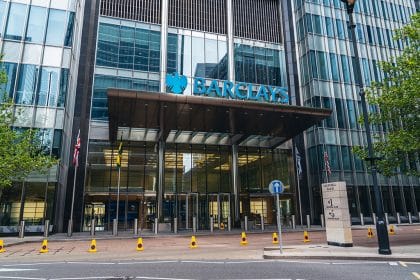Barclay analysts say that the inflow of funds has reduced, and future returns for banks are expected to dry up with a zero alternative strategy taking over the scene.
Elite bank Barclays has urged investors to look beyond the rising inflation and buy the dip of the plummeting global stocks.
According to the bank, “equities (are) more attractive than bonds, and has recommended that investors should look to buy the dip.”
Barclays believes that while inflation remains hanging, other indicator like the economic cycle, price-to-earning ratios, central banks intervention are all moderate.
Barclay analysts argue that the inflow of funds has reduced, and future returns for banks are expected to dry up with a zero alternative strategy taking over the scene.
European Equity Strategy Head Emmanuel Cau reiterated this when he said that “as risk premia increases, risk-adjusted returns will be lower. Yet we still find equities more attractive than bonds and believe dips should be bought.”
Barclays believes the coming inflation will not hinder growth as there’s demand remains high. Cau also argued that bonds are currently looking weak and seem to be affected by future inflation. He also outlines Chinese economic problems, the power tussle in Europe, and other conditions as risks facing the end of the year.
“Investors still have dry powder given money markets’ (assets under management) of $4.5 trillion. Equities are the only asset class to produce positive real yields and tend to perform well in a higher inflation regime,” added he.
Finally, he agreed that “Equities are less complacent now, as investors rotated back towards defensives in Q3 and added downside hedges. Q4 seasonality is typically supportive of equities vs bonds.”
Emmanuel Cau and his team of experienced analysts paid attention to less popular value stocks, significantly cheaper ones with great hedges. They see the banking and energy sectors fitting the description as banks appear to be highly sought after, and energy is relatively inexpensive.
Barclays is currently facing multiple issues throughout the UK as the hike have taken a hit at the Bank of England and domestic stocks supply drying up. On the other hand, its branches in Germany and Italy have seen a boost because the economies of these countries have seen a flurry of activities.
“Italy looks cheap and has stronger EPS momentum than Spain. We are positive on Banks, which have a much bigger market cap weight in the periphery than the core. Germany has sharply undershot its relative EPS momentum and looks cheap. China is a headwind, but a lot is in the price. Election results with no clear majority mean the coalition talks could drag on for months, but a centrist government should preserve the status quo,” Cau opined.
next